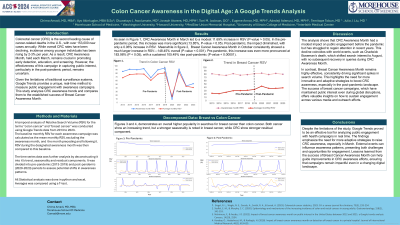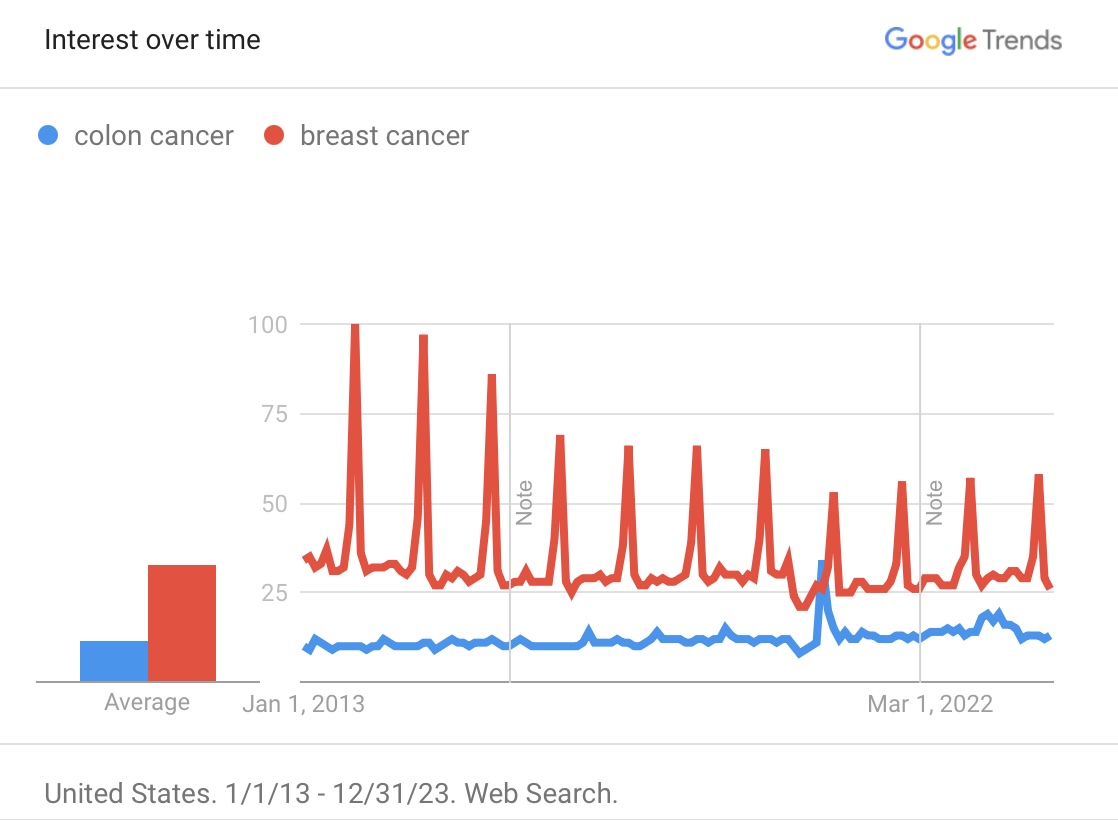Sunday Poster Session
Category: Colorectal Cancer Prevention
P0401 - Colon Cancer Awareness in the Digital Age: A Google Trends Analysis
Sunday, October 27, 2024
3:30 PM - 7:00 PM ET
Location: Exhibit Hall E

Has Audio
- CA
Chima Amadi, MD, MBA
Morehouse School of Medicine
Atlanta, GA
Presenting Author(s)
Chima Amadi, MD, MBA1, Ayo Akinkugbe, MBA, BSc2, Oluwatayo J. Awolumate, MD3, Joseph Atarere, MD, MPH4, Toni M. Jackson, DO5, Eugene Annor, MD, MPH6, Temitope Tobun, MD1, Adedeji Adenusi, MD, MPH7, Julia J.. Liu, MD8
1Morehouse School of Medicine, Atlanta, GA; 2George Washington University, Washington, DC; 3Howard University Hospital, Washington, DC; 4MedStar Union Memorial Hospital, Baltimore, MD; 5Morehouse School of Medicine, Far Rockaway, NY; 6University of Illinois College of Medicine, Morton, IL; 7One Brooklyn Health-Interfaith Medical Center, Brooklyn, NY; 8Morehouse School of Medicine, Decatur, GA
Introduction: Colon Cancer Awareness Month, established in 2000, aims to educate the public, promote screening, and increase early detection and survival rates of colon cancer. This study uses infodemiology by analyzing Google Trends' relative search volume (RSV) to evaluate the effectiveness of Colon Cancer Awareness Month in raising public interest compared to the well-established Breast Cancer Awareness campaign.
Methods: A temporal analysis of RSV for the terms "colon cancer" and "breast cancer" was obtained from Google Trends from 2013 to 2023. The baseline annual RSV for each cancer was calculated as the mean annual RSV, excluding the awareness month and the month before and after. RSV during each cancer-specific awareness month was then determined and compared to the baseline. Seasonality was assessed by evaluating the moving averages of RSV across months. Additionally, the data was segmented into pre-pandemic (2013-2019) and post-pandemic (2020-2023) periods to identify any shifts in awareness patterns.
Results: Breast Cancer Awareness Month led to a significant increase in cancer-specific RSV in October each year during the study period (mean increase of 150%). In contrast, colon cancer awareness campaigns did not show a significant increase in RSV for March during the overall study period (mean increase of 9%).
However, during the pre-pandemic period (2013-2019), there was a notable increase in RSV for Colon Cancer Awareness Month in March (mean increase of 16%), suggesting successful campaigns during these years. Post-pandemic (2020-2023), interest in colon cancer awareness shifted away from March, with no significant spikes observed during the awareness month. An overall consistent seasonal trend is evident for breast cancer but not for colon cancer.
Discussion: Colon cancer awareness campaigns in March did not significantly increase RSV, as opposed to Breast Cancer Awareness Month. The pre-pandemic data indicates that Colon Cancer Awareness campaigns were more effective during 2013-2019. However, post-pandemic, the interest in colon cancer awareness appears to have shifted away from March, suggesting a potential impact of the pandemic or other historical events on public interest and campaign effectiveness.
These findings highlight the need for adaptive strategies for the March colon cancer campaign to maintain and enhance public interest.

Disclosures:
Chima Amadi, MD, MBA1, Ayo Akinkugbe, MBA, BSc2, Oluwatayo J. Awolumate, MD3, Joseph Atarere, MD, MPH4, Toni M. Jackson, DO5, Eugene Annor, MD, MPH6, Temitope Tobun, MD1, Adedeji Adenusi, MD, MPH7, Julia J.. Liu, MD8. P0401 - Colon Cancer Awareness in the Digital Age: A Google Trends Analysis, ACG 2024 Annual Scientific Meeting Abstracts. Philadelphia, PA: American College of Gastroenterology.
1Morehouse School of Medicine, Atlanta, GA; 2George Washington University, Washington, DC; 3Howard University Hospital, Washington, DC; 4MedStar Union Memorial Hospital, Baltimore, MD; 5Morehouse School of Medicine, Far Rockaway, NY; 6University of Illinois College of Medicine, Morton, IL; 7One Brooklyn Health-Interfaith Medical Center, Brooklyn, NY; 8Morehouse School of Medicine, Decatur, GA
Introduction: Colon Cancer Awareness Month, established in 2000, aims to educate the public, promote screening, and increase early detection and survival rates of colon cancer. This study uses infodemiology by analyzing Google Trends' relative search volume (RSV) to evaluate the effectiveness of Colon Cancer Awareness Month in raising public interest compared to the well-established Breast Cancer Awareness campaign.
Methods: A temporal analysis of RSV for the terms "colon cancer" and "breast cancer" was obtained from Google Trends from 2013 to 2023. The baseline annual RSV for each cancer was calculated as the mean annual RSV, excluding the awareness month and the month before and after. RSV during each cancer-specific awareness month was then determined and compared to the baseline. Seasonality was assessed by evaluating the moving averages of RSV across months. Additionally, the data was segmented into pre-pandemic (2013-2019) and post-pandemic (2020-2023) periods to identify any shifts in awareness patterns.
Results: Breast Cancer Awareness Month led to a significant increase in cancer-specific RSV in October each year during the study period (mean increase of 150%). In contrast, colon cancer awareness campaigns did not show a significant increase in RSV for March during the overall study period (mean increase of 9%).
However, during the pre-pandemic period (2013-2019), there was a notable increase in RSV for Colon Cancer Awareness Month in March (mean increase of 16%), suggesting successful campaigns during these years. Post-pandemic (2020-2023), interest in colon cancer awareness shifted away from March, with no significant spikes observed during the awareness month. An overall consistent seasonal trend is evident for breast cancer but not for colon cancer.
Discussion: Colon cancer awareness campaigns in March did not significantly increase RSV, as opposed to Breast Cancer Awareness Month. The pre-pandemic data indicates that Colon Cancer Awareness campaigns were more effective during 2013-2019. However, post-pandemic, the interest in colon cancer awareness appears to have shifted away from March, suggesting a potential impact of the pandemic or other historical events on public interest and campaign effectiveness.
These findings highlight the need for adaptive strategies for the March colon cancer campaign to maintain and enhance public interest.

Figure: Relative Search Volume of Colon Cancer and Breast Cancer showing persistent seasonal peaks for Breast cancer.
Disclosures:
Chima Amadi indicated no relevant financial relationships.
Ayo Akinkugbe indicated no relevant financial relationships.
Oluwatayo Awolumate indicated no relevant financial relationships.
Joseph Atarere indicated no relevant financial relationships.
Toni Jackson indicated no relevant financial relationships.
Eugene Annor indicated no relevant financial relationships.
Temitope Tobun indicated no relevant financial relationships.
Adedeji Adenusi indicated no relevant financial relationships.
Julia Liu indicated no relevant financial relationships.
Chima Amadi, MD, MBA1, Ayo Akinkugbe, MBA, BSc2, Oluwatayo J. Awolumate, MD3, Joseph Atarere, MD, MPH4, Toni M. Jackson, DO5, Eugene Annor, MD, MPH6, Temitope Tobun, MD1, Adedeji Adenusi, MD, MPH7, Julia J.. Liu, MD8. P0401 - Colon Cancer Awareness in the Digital Age: A Google Trends Analysis, ACG 2024 Annual Scientific Meeting Abstracts. Philadelphia, PA: American College of Gastroenterology.
